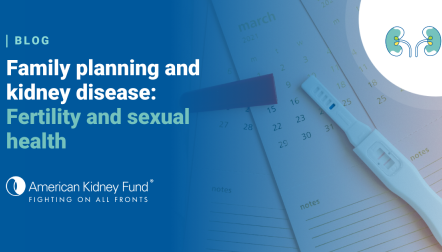
Chronic Kidney Disease (CKD) and Sexual Health
- Medically reviewed by
- Dr. Jessica Tangren
- Last updated
- September 24, 2024
What is sexual health?
The World Health Organization (WHO) defines sexual health as a state of physical, emotional, mental, and social well-being in relation to the ways you experience and express yourself sexually.
Sexual health also means you have access to information about sex and sexual health care. This kind of care includes:
- A gynecologist (doctor who cares for women's sexual health)
- Some gynecologists are obstetrician-gynecologists (OB/GYN), which means they take care of women's sexual health and pregnant women
- A urologist (doctor who cares for the urinary system and men's sexual health)
- Sexually transmitted infection testing
Sexual health includes understanding your ability to have children and options for preventing pregnancy (sometimes called family planning).
How does CKD affect my sexual health?
Your kidneys are responsible for making, releasing, and controlling hormones (chemical messengers in your body). Your hormones play a role in how you feel, and your ability to become aroused (turned on). When your kidneys no longer control hormones as they should, it may be harder to become aroused and you may not be interested in sex. Medicines to treat CKD, anemia and issues with body image can also lower your interest in sex.
Sexual health is a part of your overall health and wellbeing; it is a normal part of life. Disruptions or dysfunctions in your sex life can affect the way you feel, and you may struggle with your mental health.
How does CKD impact women's sexual health?
For women with CKD, changes in hormones can affect your menstrual cycles, also called your period. You may not get your period every month, and the time between your periods might be longer or shorter.
This happens because CKD can lower the amount of estrogen in your body, a hormone that is involved in women's sexual and reproductive development and regulation of the reproductive system, including the growth of your breasts and your menstrual cycle. Besides changes to your periods, low amounts of estrogen can also cause dryness in your vagina and pain while having sex. It can also lead to premature (early) menopause.
How does CKD impact men's sexual health?
Men with CKD commonly experience erectile dysfunction (ED). Also known as impotence, this is when it is difficult for your penis to become or stay hard during sex.
ED can be caused by low testosterone in men. Testosterone is a hormone that is involved in the sexual and reproductive development of men, including the growth of the penis, testicles, and it also plays a role in muscle size.
Diabetes can also cause ED. High blood sugar levels can damage nerve cells in the penis, which can keep you from getting an erection.
Birth Control and CKD
Birth control, also called contraception, refers to medicines and devices used to prevent a pregnancy. Some kinds of birth control are safer for people with CKD than others.
It is important to know that it is still possible to become pregnant even with kidney disease, kidney failure, or while on dialysis. If you are sexually active and do not want to become pregnant, consider using a form of birth control to prevent pregnancy.
CKD patients can safely use what is known as "barrier methods". These are devices that block sperm from getting to an egg, thus preventing pregnancy. Barrier methods include:
- Condoms
- Diaphragms
- Sponges
- Cervical Caps
Condoms are a very common and successful form of birth control, when used correctly. They can be purchased at most pharmacies. To learn how to correctly use condoms, you can visit the CDC's webpage.
Hormonal birth control prevents pregnancy by preventing sperm from meeting an egg. It can come in the form of a pill, patch, vaginal ring, implant, intrauterine device (IUD), and injections. IUDs and the implant are sometimes called long-acting reversible contraception. These options can last for years and are safe for CKD patients.
Hormonal birth control can be made of two hormones: estrogen and progestin. Some forms have both, and some forms have just progestin.
Estrogen containing birth control can increase the risk of high blood pressure, which can be dangerous for CKD patients. For this reason, it is not recommended that women with CKD take estrogen containing birth control, also known as combined birth control. Options with just progestin, however, are safe.
Talk to your provider about what kind of birth control is best for you.
How does my kidney transplant affect my sexual health?
After receiving a kidney transplant, many of your body's processes will return to "normal". This includes your hormones. Your ability to become aroused and your interest in sex might increase.
For women, your periods may come back after a transplant.
For men, you may experience less frequent ED.
Talk to your doctor about these post-transplant changes and how they might impact your sexual health.




